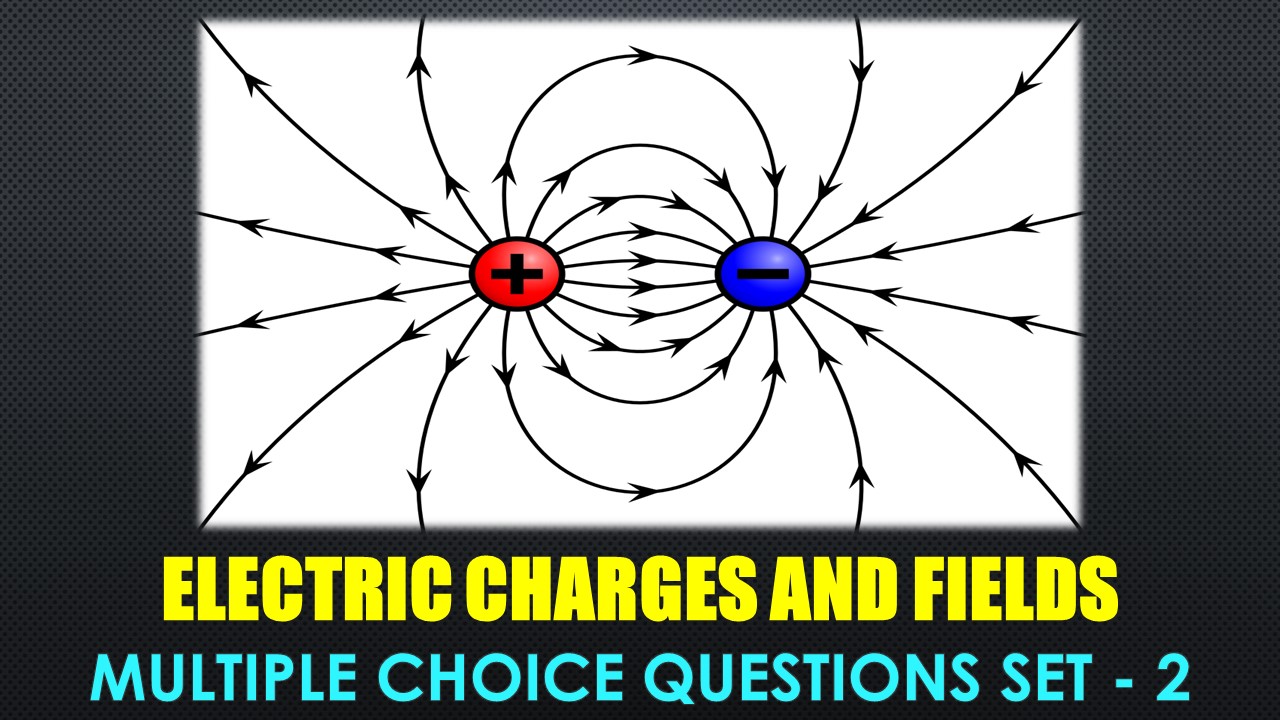CBSE Class 12 Electric Charges and Fields Multiple Choice Questions with Answers. MCQ Questions Class 12 Electric Charges and Fields with Answers Is Prepared Based on Latest Exam Pattern. Students can solve NCERT Class 12 Electric Charges and Fields MCQs with Answers to know their preparation level.
Students who are searching for NCERT MCQ Questions for Class 12 Electric Charges and Fields with Answers are compiled here to get good practice on all fundamentals. Know your preparation level on MCQ Questions for Class 12 Electric Charges and Fields with Answers. You can also verify your answers from our provided MCQ Class 12 Electric Charges and Fields with Answers. So, ace up your preparation with MCQ of Class 12 Physics Examinations.
MCQ Questions Class 12 Electric Charges and Fields with Answers - Set - 2
Question 1:
The dielectric constant of a metal is:
(a) 0
(b) 1
(c) ∞
(d) -1
Correct Answer – (C)
Question 2 :
If sphere of bad conductor is given charge then it is distributed on:
(a) surface
(b) inside the surface
(c) only inside the surface
(d) None
Correct Answer – (D)
Question 3 :
The number of electron-taken out from a body to produce 1 coulomb of charge will be :
(a) 6.25 × 1018
(b) 625 × 1018
(c) 6.023 × 1023
(d) None
Correct Answer – (A)
Question 4 :
Three charges + 3q + q and Q are placed on a st. line with equal separation. In order to maket the net force on q to be zero, the value of Q will be :
(a) +3q
(b) +2q
(c) -3q
(d) -4q
Correct Answer – (A)
Question 5 :
The position of the charge inside the enclosing surface is changed in such a way that the total charge remains constant. Then the total normal electric flux through the enclosing surface:
(a) increases
(b) decreases
(c) changes erratically
(d) Remains unchanged.
Correct Answer – (D)
MCQ Questions Class 12 Electric Charges and Fields with Answers
Question 6 :
Electric field in a cavity of metal:
(a) depends upon the surroundings
(b) depends upon the size of cavity
(c) is always zero
(d) is not necessarily zero
Correct Answer – (D)
Question 7 :
The work done in rotating an electric dipole in an electric field:
(a) W = ME (1 – cos θ)
(b) W = ME tan θ
(c)W = ME sec θ
(d) None
Correct Answer – (A)
Question 8 :
If an electric dipole is kept in a uniform electric field then resultant electric force on it is :
(a) always zero
(b) never zero
(c) depend upon capacity of dipole
(d) None
Correct Answer – (A)
Question 9 :
Which one of the following is the unit of electric field?
(a) Coulomb
(b) Newton
(c) Volt
(d) N/C
Correct Answer – (D)
Question 10 :
An electron and a proton are placed in the same uniform electric field. What will be the ratio of the acceleration of electron to that of proton?
(a) 1
(b) zero
(c) mp/me
(d) me/mp
mpmeMP(d) memp
Correct Answer – (C)
- NCERT Solutions Class 11 Chemistry Chapter 1 : Some Basic Concepts of Chemistry
- NCERT Solutions Class 11 Chemistry Chapter 2 : Structure Of The Atom
- NCERT Solutions Class 11 Chemistry Chapter 3 : Classification of Elements and Periodicity in Properties
- NCERT Solutions Class 11 Chemistry Chapter 4 : Chemical Bonding and Molecular Structure
- NCERT Solutions Class 11 Chemistry Chapter 5 : States of Matter
- NCERT Solutions Class 11 Chemistry Chapter 6 : Thermodynamics
- NCERT Solutions Class 11 Chemistry Chapter 7 : Equilibrium
- NCERT Solutions Class 11 Chemistry Chapter 8 : Redox Reactions
- NCERT Solutions Class 11 Chemistry Chapter 9 : Hydrogen
- NCERT Solutions Class 11 Chemistry Chapter 10 : The s-Block Elements
- NCERT Solutions Class 11 Chemistry Chapter 11 : The p-Block Elements
- NCERT Solutions Class 11 Chemistry Chapter 12 : Organic Chemistry: Some Basic Principles and Techniques
- NCERT Solutions Class 11 Chemistry Chapter 13 : Hydrocarbons
- NCERT Solutions Class 11 Chemistry Chapter 14 : Environmental Chemistry




